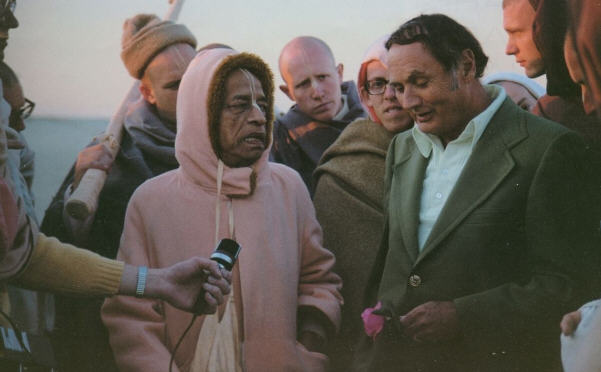
During a morning walk in Los Angeles on June 25, 1975, His Divine Grace A.C. Bhaktivedanta Swami speaks on the value of Krsna consciousness with Dr. J. Stillson Judah, then of the Graduate Theological Union in Berkeley, California.
Srila Prabhupada: Neither the theosophist nor the theologian has a clear idea of God. Do you agree?
Dr. Judah: I would make a distinction between knowing God and knowing about God. There is knowledge about God in various books, but one does not know God unless one somehow experiences God. I feel that this is the one thing the bhakti movement of Sri Caitanya has done: it has allowed its devotees to experience God, to know Him personally in a way that changes their lives.
Srila Prabhupada: That is the Vedic civilization.
Dr. Judah: Yes.
Srila Prabhupada: Na te viduh svartha-gatim hi visnum. Materialistic persons do not know Visnu, or God, nor do they know that the ultimate goal of life is to know Visnu. That knowledge is essential to human life. But it is missing. People do not care to know the ultimate goal of human life. That is their defect. Nobody cares to know, especially in this age.
So that is the defeat of human civilization. They have come to the human form of life. Now they must know what God is. Otherwise, it is defeat.
Dr. Judah: That's true.
Srila Prabhupada: The opportunity is given by nature, which grants the human being good consciousness to know God, Visnu. Now, practically, especially in the Western world, no one can say what is God.
Dr. Judah: That is quite true.
Srila Prabhupada: So, if we are offering, "Here is God," why do they not accept? What is the objection?
Dr. Judah: I think the great problem in the Western world is that it has always been involved in materialism.
Srila Prabhupada: That means the people don't want to know God. That is a very horrible condition.
Dr. Judah: That's true.
Srila Prabhupada: Not only horrible it is the animals' condition. People who do not want to know God are just like the animals. Animals are uninterested in God. They have no church or temple. But in the human society, whether one is Hindu or Muslim or Christian, there is some arrangement for understanding God. Now people are also neglecting that, all over the world. The Communists hate to say anything about God. So ultimately people are coming to such a condition no word about God. So that is the condition of ordinary persons today.
Now, apart from them, the theologians and theosophists are at least trying to understand God. But they cannot know God definitely. So why don't they accept knowledge from us? We are offering, "Here is God." Why should they object? If you do not know something and if I give you the information, why should you not take it?
Dr. Judah: That's a good question.
Srila Prabhupada: For example, to gain higher technological knowledge, people from India go to foreign countries. One can take knowledge from anywhere. There should not be sectarianism: "Oh, why shall I take knowledge from here and there?" Wherever knowledge is available, we should take it. That is the real position of the seeker of knowledge.
Canakya Pandita says, "If in a pot of poison there is a little nectar, take the nectar." And amedhyad api kancanam: "If there is gold in a filthy place, take the gold." Not that the gold has been polluted because it is in a filthy place. If there is some gold in the filthy place, don't hesitate. Take it.
And nicad apy uttamam vidyam. Generally, people used to take education from brahmanas. So Canakya Pandita advises, "If actual education is available from a lower-class man a sudra[laborer] or candala [outcaste] take it. Accept him as your master."
And stri-ratnam duskulad api. In India, according to Vedic civilization a young man marries a girl only after scrutinizing her family tradition. But Canakya advises, "If a nice, educated, beautiful girl comes even from an abominable family, accept her." Ratnam means "jewel." If the girl is like a jewel although born of a low family, accept her.
One should accept anything very good, even if it is available from an undesirable place. So if you are actually seeking God and God is available from the Vedic literature, why don't you accept it? Why you should refuse that knowledge? That is not a very good sign.
Dr. Judah: No, that is true.
Srila Prabhupada: So we are offering God. Why should people not take seriously what we are offering?
Now, people may object, "Krsna is Indian, Krsna is Hindu, so we shall not accept Him as God." But in the Bhagavad-gita it is written sri bhagavan uvaca: "God said." So the verses are the words of God. And Krsna says, mattah parataram nanyat kincid asti dhananjaya: "There is no element superior to Me." Only God can say that. You may not like the word Krsna, but take the words of God. Who can be superior to God?
Dr. Judah: That's true.
Srila Prabhupada: So in this way you can read the Bhagavad-gita and remove the word Krsna, and it is still God's word. It is all factual knowledge. So why should people not take the science of God from Bhagavad-gita?
Dr. Judah: Yes.
Srila Prabhupada: God can say, "There is no principle superior to Me." And that is stated in Bhagavad-gita:
mattah parataram nanyat
kincid asti dhananjaya
mayi sarvam idam protam
sutre mani-gana iva
"O conquerer of wealth, there is no truth superior to Me. Everything rests upon Me, as pearls are strung on a thread." Every word here is God's word. You may accept Krsna as God or not, but the words are God's words. That is Bhagavad-gita.
